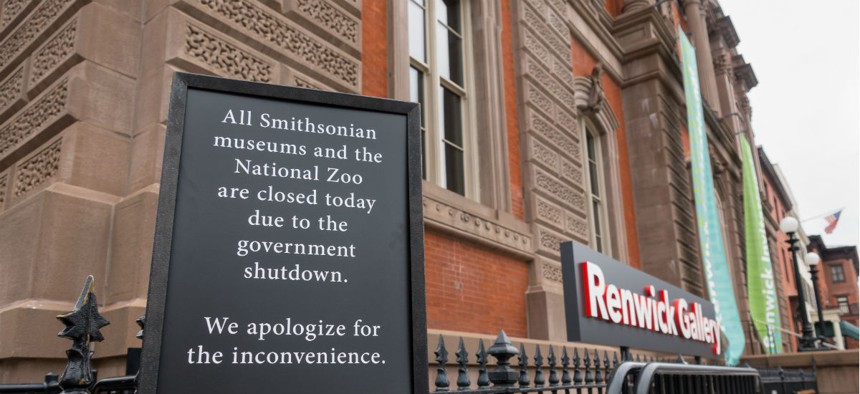
bakdc/shutterstock.com
Federal Employees Did not Sign Up to be Shut Down
The current impasse reflects a pattern of mismanagement of public service talent under the Trump administration.
Another Trump-era government shutdown continues, this one with no end in sight. The President, who initially seemed to waver in his demands for wall funding, was urged to shut down the government by the far-right Freedom Caucus. Their actions will affect citizens seeking public services. But it will most immediately and negatively hurt the federal employees we rely on to make government work, reflecting a pattern of mismanagement of public service talent under the Trump administration.
Freedom caucus leader Mark Meadows urged Trump to “stick to his guns” in this “fight.” He told his followers to “remember the Alamo.” His somewhat less inspiring message to the 800,000 federal employees in the trenches who will not be paid until government reopens: “It’s actually part of what you do when you sign up for any public service position.”
Meadows is wrong for a number of reasons. He will continue to receive a paycheck. More troublingly, a politician who uses the fraught language of war to justify an inability to perform the most basic governmental task–to pass a budget–is one that that prefers fighting to governing. And it is hard to imagine we are made safer by not funding the departments of Justice, State or the Homeland Security.
But what Trump and Meadows get most profoundly wrong is the motivation of federal employees. As a professor of public management, I have contributed to a broad body of research showing that people join the public service out of a desire to serve, to make a difference. Those employees with higher public service motivation tend to work harder, improve performance, be more satisfied and more likely to stay in government.
Public service motivation is the federal government’s secret weapon to maintain an extraordinary workforce even in turbulent times. But the Trump administration seems determined to weaken it. Research shows that public service motivation declines when people perceive that their workplace is no longer a place where they can make a difference. Motivation needs to be actively cultivated, not taken for granted. How do you think the 380,000 people being told that their work is “not essential” feel?
Regular citizens are starting to experience the costs of a shutdown, exemplified by overflowing trash bins at National Park facilities. The frustration for federal employees is even worse because they are doubly punished: they face financial hardship and also are denied a chance to do their jobs.
One furloughed employee, Daniel A Sobien of the National Weather Service, told the New York Times that federal employees are “tired of being political pawns.” Brian Turner, a TSA officer, said “I love working for the country,” but added, “I can’t go two months without a paycheck.”
The shutdown is part of a broader pattern for this federal workforce. It is no coincidence that job satisfaction is declining in places such as the State and Education departments, the Consumer Financial Protection Bureau, and the Environmental Protection Agency, places where leaders have seemed indifferent or even actively hostile to the organizational missions. Employees at the departments of Defense, Justice and Interior, as well as those at EPA, will greet the new year without a permanent leader in place.
Public servants have seen President Trump seek to make it easier to fire them, cancel a pay raise, and even blame his legal troubles on the deep state. Trump also applied a partisan us-versus-them spin to the shutdown by falsely tweeting “that most of the people not getting paid are Democrats.” The cumulative effect of this mix of cynicism and conspiracy-mongering is to not just weaken the motivation of current employees, but to also make it harder to recruit the next generation of public servants.
Contrary to what Congressman Meadows said, public servants did not sign up to be shut down. As Sharon Stiteler, a National Park Ranger in Mississippi wrote “None of us took our jobs to get rich. We are public servants, who love what we do. We are incredibly frustrated that we can’t do a fair day’s work for a fair day’s pay.”
Indifference to the actual business of governing is a luxury, one that is afforded to those living in a country where the government works pretty well, as it does in the United States. Most of us do not need to pay attention to the various tasks of government, or to the quality of the federal workforce. But we should expect our elected representatives to do better, to understand that good government needs good government employees. Such employees did not sign up to be sidelined and see their work disrupted. They signed up to serve.
Donald Moynihan is the McCourt Chair at the McCourt School of Public Policy, Georgetown University.






